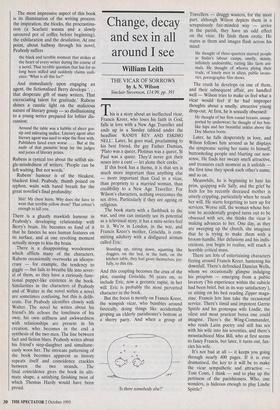Change, decay and sex in all around I see
William Leith
THE VICAR OF SORROWS by A. N. Wilson Sinclair-Stevenson, .£14.99, pp. 391 This is a story about an ineffectual vicar, Francis Kreer, who loses his faith in God, falls in love with a New Age Traveller and ends up in a Sunday tabloid under the headline 'RANDY REV AND ESKIMO NELL'. Later, he goes mad, proclaiming to his best friend, the gay Father Damian, 'Plato was a queer, Plotinus was a queer, St Paul was a queer. They'd never got their noses into a cunt — let alone their cocks.'
If this book has a theme, it is that sex is much more important than anything else — more important than God to a vicar, than propriety to a married woman, than credibility to a New Age Traveller. For Wilson's characters, nothing overcomes the sex drive. Particularly if they are ageing or religious.
The book starts with a flashback to the war, and one can instantly see its potential as a televisual story; it has a mini-series feel to it. We're in London, in the war, and Francis Kreer's mother, Griselda, is com- mitting adultery with a disfigured airman called Eric:
Standing up, sitting down, squatting like doggies, on the bed, in the bath, on the kitchen table, they had given themselves, joy- fully, to this rite.
And this coupling becomes the crux of the plot, causing Griselda, 50 years on, to include Eric, now a geriatric rapist, in her will. Eric is probably the most perverted character in the book.
But the focus is mostly on Francis Kreer, the wimpish vicar, who bumbles around farcically, doing things like accidentally groping an elderly parishioner's bottom at a sherry party. And when a group of 'Is there somebody else?' Travellers — druggy wasters, for the most part, although Wilson depicts them in a scrupulously fair-minded way — arrive in the parish, they have an odd effect on the vicar. He finds them erotic. He stares at them and images flash across his mind:
He thought of three-quarters starved people in Stalin's labour camps, smelly, skinny, infinitely undesirable, rutting like farm ani- mals. He thought of whores plying their trade, of lonely men in alleys, public lavato- ries, pornographic film shows.
The crush he develops on one of them, and their subsequent affair, are handled well — Wilson tries to make us feel what a vicar would feel if he had improper thoughts about a smelly, attractive young drop-out. At first, he is sexually obsessed:
He thought of her firm round breasts, unsup- ported by underwear; he thought of her boy- like hips and her beautiful ankles above the Doc Marten boots.
Later, he falls desperately in love, and Wilson follows him around as he displays the symptoms: saying her name to himself, buttonholing people and blurting out non- sense. He finds her sweaty smell attractive, and treasures each moment as it unfolds — the first time they speak each other's name, and so on.
Meanwhile, he is beginning to hate his prim, quipping wife Sally, and the grief he feels for his recently deceased mother is utterly crippling, particularly when he reads her will. He starts forgetting to turn up for services. Worse still, the woman whose bot- tom he accidentally groped turns out to be obsessed with sex; she thinks the vicar is making advances to her. One day, as they are sweeping up the church, she imagines that he is trying to make them with a broom-handle. Her delusions and his indis- cretions, you begin to realise, will reach a horrible critical mass.
There are lots of entertaining characters fizzing around Francis Kreer, hastening his downfall. There's defrocked Damian Wells, whom we occasionally glimpse indulging his priapism — emerging from a public lavatory Otis experience within the cubicle had been brief, but in its way satisfactory'), or sitting on his bed reading Zipper maga- zine. Francis lets him take the occasional service. There's timid and impotent Gerrie Spittle and his grotesque wife Lindie, the vilest and most prurient bores one could imagine. There's the Wing-Commander, who reads Latin poetry and still has sex with his wife into his seventies, and there's moustachioed Miss Bill, who at first seems to fancy Francis, but later, it turns out, fan- cies his wife.
It's not bad at all — it keeps you going through nearly 400 pages. If it is ever dramatised, the key to it will be to make the vicar sympathetic and attractive — Tom Conti, I think — and to play up the pettiness of the parishioners. Who, one wonders, is hideous enough to play Lindie Spittle?


















































 Previous page
Previous page